Balbharti Maharashtra State Board Class 8 History Solutions Chapter 2 Europe and India Notes, Textbook Exercise Important Questions and Answers.
Maharashtra State Board Class 8 History Solutions Chapter 2 Europe and India
Class 8 History Chapter 2 Europe and India Textbook Questions and Answers
1. Rewrite the statements by choosing the appropriate options:
Question 1.
In 1453, the city of was conquered by Ottoman Turks.
(a) Venice
(b) Constantinople
(c) Rome
(d) Paris
Answer:
(b) Constantinople
Question 2.
The Industrial Revolution began in
(a) England
(b) France
(c) Italy
(d) Portugal
Answer:
(a) England
![]()
Question 3.
…….. tried to put restrictions on the illegal trade of British.
(a) Siraj-ud-Daulah
(b) Mir Kasim
(c) Mir Jafar
(d) Shah Alam
Answer:
(b) Mir Kasim
2. Explain the following concepts:
Question 1.
Colonialism:
Answer:
1. Exploitation of one country by another and making it into a colony is called Colonialism.
2. On the basis of economic and military strength one country occupies a region of another country and establishes its political supremacy.
3. Many European nations established their colonies in various parts of the continents of America, Asia, Africa and Australia.
4. They grabbed the power by using force to exploit the colonies systematically. This gave rise to Imperialism.
Question 2.
Imperialism:
Answer:
- Imperialism means a powerful country controls other country by establishing its overall domination.
- The objective of imperialism is to establish more and more colonies.
- European countries with strong military power and imperialist aspirations enslaved the countries in Asia and Africa.
- Imperialism gained momentum after industrial revolution and came to an end in twentieth century.
![]()
Question 3.
Age of Renaissance:
Answer:
(1) Renaissance literally means rebirth or revival. In the latter phase of medieval Europe, reformation, religious reform movement and geographical discoveries gained momentum.
(2) It was a comprehensive movement which touched all aspects of human life. The Greek and Roman traditions in art, architecture and philosophy were revived in the Age of Renaissance.
(3) Humanitarianism got great impetus.
(4) Renaissance inspired all round progress and ushered a new era in the history of world.
(5) This developments took place from 13th century to 16th century in Europe. This period is known as the Age of Renaissance.
Question 4.
Capitalism:
Answer:
1. Many traders participated in the competition for trade with Asia after the discovery of the new sea routes to the east.
2. As it was not possible to carry out trade single-handedly, it was decided by the traders to pool their resources to raise capital for trade.
3. Many trading companies like the East India Company were formed.
4. Trade with Oriental countries was very profitable and responsible for economic prosperity.
5. The ruling powers gave protection and trade concessions to these companies.
6. This led to the accumulation of wealth in Europe. This wealth was used as capital for trade and commerce which gave rise to capitalism in Europe.
3. Explain the following statements with reasons:
Question 1.
Siraj-ud-Daulah was defeated in the Battle of Plassey.
Answer:
1. The officers of the British East India Company misused the trade concessions and built fortification around the factory in Kolkata.
2. Siraj-ud-Daulah captured the factory at Kolkata.
3. This created discontent in England.
4. Robert Clive diplomatically bribed Mir Jafar, Commander in Chief of Nawab’s army and promised to make him Nawab of Bengal.
5. So. the Army of Siraj-ud-Daulah under the command of Mir Kasim did not join the battle against the British at Plassey in 1757 AD.
6. Thus, the British won the battle of Plassey by treachery and deceit.
![]()
Question 2.
The European countries felt the necessity of finding new sea routes to Asia.
Answer:
- The Ottoman Turks captured Constantinople. the capital of Byzantine Empire. in 1453 AD.
- All land trade routes joining Asia and Europe passed through this city.
- It stopped the flow of valuable goods from the countries in the east. Therefore, the European countries felt the necessity of finding new sea routes to Asia.
Question 3.
European rulers started giving military protection and trade concessions to the trading companies.
Answer:
1. With the discovery of new sea routes to the east, trade with oriental countries became very profitable. Thus, European trade prospered.
2. Competition for trade began among many European nations.
3. The traders pooled their resources and formed trading companies like the East India Company.
4. As this trade brought economic prosperity, the European rulers started giving military protection and trade concessions to these trading companies.
4. Complete the following table.
Question 1.
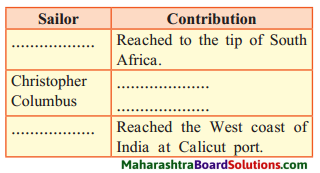
Answer:
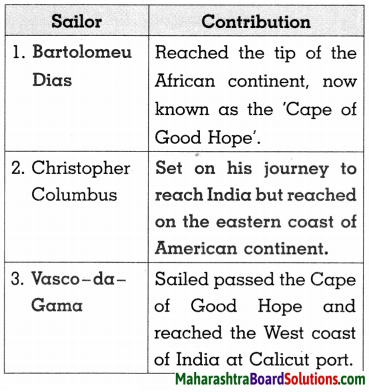
Leonardo Da Vinci :
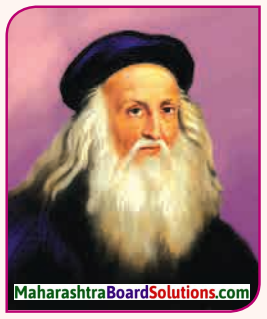
- A famous personality of the Renaissance period who was well versed in different branches of science and arts.
- He had mastery over varied subjects such as sculpture, architecture, mathematics, engineering, music, astronomy, etc.
- His paintings ‘Monalisa’ and ‘The Last Supper’ became immortal.
![]()
Let us Know:
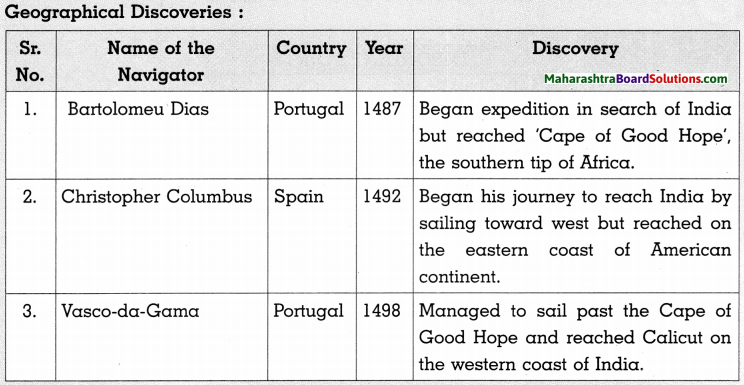
Project:
Collect information and pictures about the work of famous painters, writers, scientists during renaissance period with the help of reference books and internet. Present a project on it in the classroom.
Class 8 History Chapter 2 Europe and India Additional Important Questions and Answers
Rewrite the statements by choosing the appropriate options:
Question 1.
American colonies organised the army under the leadership of and won against England.
(a) Thomas Jefferson
(b) Robert Clive
(c) George Washington
(d) Johannes Gutenberg
Answer:
(c) George Washington
![]()
Question 2.
The British East India Company established its factory at
(a) Kolkata
(b) Cochin
(c) Mumbai
(d) Surat
Answer:
(d) Surat
Question 3.
Siraj-ud-Daulah was defeated because diplomatically bribed Mir Jafar.
(a) Robert Clive
(b) Lord Wellesley
(c) Lord Dalhousie
(d) Lord Cornwallis
Answer:
(a) Robert Clive
Question 4.
Tipu Sultan died in the battle of in 1799.
(a) Mysore
(b) Bengaluru
(c) Srirangapatna
(d) Buxar
Answer:
(c) Srirangapatna
Question 5.
The chieftain of rose against the British.
(a) Multan
(b) Bengal
(c) Carnatic
(d) Jhansi
Answer:
(a) Multan
![]()
Question 6.
was the first Portuguese sailor who landed on the western coast of India.
(a) Christopher Columbus
(b) Bartolomeu Días
(c) Vasco-da- Gama
(d) Leonardo da Vinci
Answer:
(c) Vasco-da- Gama
Question 7.
England established colonies on the eastern coast of America.
(a) ten
(b) thirteen
(c) eight
(d) seventeen
Answer:
(b) thirteen
![]()
Name the following:
Question 1.
Invented printing press
Answer:
Johannes Gutenberg
Question 2.
Empire of Ottoman Turks
Answer:
Byzantine
Question 3.
The Bill which laid limitations on powers of the King in England.
Answer:
Bill of Rights
![]()
Question 4.
Mughal Emperor who gave permission to Britishers to establish factory at Surat.
Answer:
Emperor Jahangir
Question 5.
Came to be known as ‘World Factory’.
Answer:
England.
Answer the following in one sentence:
Question 1.
Which period in the history of Europe is known as Period of Renaissance?
Answer:
In the history of Europe, the last phase of medieval period i.e. 13th to century in Europe is known as the Period of Renaissance.
Question 2.
Name the developments that laid the foundation of modern era.
Answer:
The Renaissance, the Reformation and the geographical discoveries laid the foundation of the modern era.
![]()
Question 3.
State the significance of the invention of printing press.
Answer:
It became possible to take new ideas, new concepts and knowledge to all the sections of society due to the invention of the printing press.
Question 4.
What was the effect of the Reformation movement in the area of religion?
Answer:
Individual freedom and rationalism gained importance in the area of religion due to the Reformation movement.
Question 5.
State the principles that the French Revolution gave to the world.
Answer:
The French Revolution gave the principles of liberty equality and fraternity to the world.
Question 6.
Why did the British establish East India Company?
Answer:
The British established the East India Company to carry out trade in India.
![]()
Question 7.
What was the outcome of the American War of Independence?
Answer:
Due to American War of Independence, a new nation known as the United States of America with a federal government, written constitution and based on the principles of democracy was formed.
Do as Directed:
1. Complete the concept Map:
Question 1.
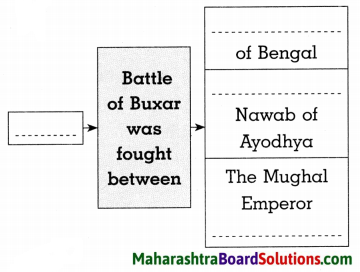
Answer:
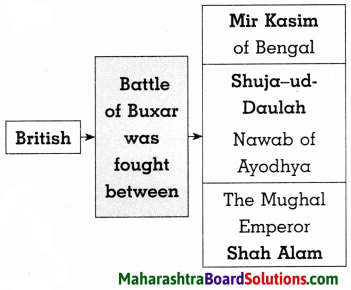
Question 2.
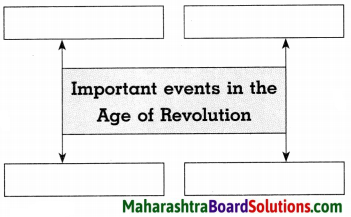
Answer:
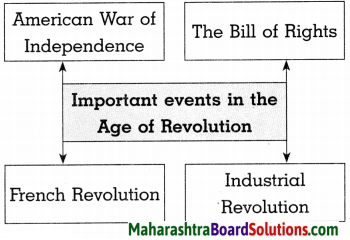
2. Arrange the following events in chronological order on timeline:
1. Battle of Srirangapatna
2. Second Anglo-Sikh War
3. Battle of Buxar
4. Battle of Plassey
Answer:
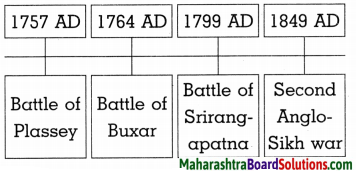
Write short notes:
Question 1.
Leonardo-da-Vinci:
Answer:
- Leonardo-da-Vinci is regarded as an all round personality of the Renaissance period.
- He was well versed with the different branches of science and art.
- He had mastery over varied subjects such as sculpture, architecture, mathematics, engineering, music, astronomy, etc.
- But he became world-famous as a painter.
- His paintings ‘Monalisa’ and ‘The Last Supper’ became immortal.
Question 2.
Carnatic Wars :
Answer:
- There was competition among the European nationals to secure monopoly of trading rights in India.
- Due to this three Cainatic wars were fought between England and France.
- England defeated France in the third Carnatic War.
- Alter this, there was no strong European competitor for British East India Company in India.
![]()
Question 3.
The Battle of Buxar:
Answer:
- Mir Kasim was replaced by Mir Jafar when he tried to put restrictions on illegal practices of the British.
- Mir Kasim, the deposed Nawab of Bengal, Shuja-ud-Daulah, the Nawab of Ayodhya and Mughal Emperor Shah Alam formed an affiance.
- They undertook a campaign to restrain the activities of the British in Bengal.
- They were defeated by the British in the Battle of Buxar in 1764 in Bihar.
- The Treaty of Allahabad was signed after the Battle of Buxar. The British secured the right to collect revenue from Bengal province by this treaty.
Explain the following statements with reasons:
Question 1.
The period between 18th and 19th century came to be known as ‘Age of Revolutions’.
Answer:
1. The British Parliament passed The Bill of Rights in 1689. It established sovereignty of Parliament and curtailed powers of the King.
2. This gave momentum to the development of Parliamentary Democracy in England.
3. The thirteen British colonies in America won the War of Independence in 1783.
4. These thirteen colonies established the first federal republic, known as the United States of America.
5. The people of France revolted against the unjust and uncontrolled monarchy and feudalism. They established a Republic.
6. The Industrial Revolution in Europe in the latter part of the 18th century brought revolutionary changes in Europe.
7. These changes had long-lasting effect on the entire world.
8. All these revolutionary events took place during 18th and 19th century period. Hence it is known as the ‘Age of Revolutions’.
Question 2.
England was described as World Factory.
Answer:
- There were many revolutionary changes in the latter part of the 18th century in Europe.
- Many technological innovations in Europe gave enormous outputs
- Goods were produced with the help of machines running on steam and later on electricity. It was the dawn of the age of machines.
- Though the industrial revolution started in England it gradually spread to other ports of the western world.
- During this period. England enjoyed industrial prosperity and was described as World Factory.
![]()
Question 3.
The British captured Sindh in 1843.
Answer:
- The British were afraid of Russian aggression on India via Afghanistan.
- They decided to bring Afghanistan under their control to ensure the safety of their Indian Empire.
- The province of Sindh was located at the Northwest frontier.
- All routes to Afghanistan passed through Sindh.
- Realising its strategic importance, the British captured Sindh in 1843.
Answer the following questions in 25 to 30 words:
Question 1.
Write about the Religious Reform Movement.
Answer:
- The independent intellectuals attacked the old religious ideologies and beliefs of Roman Catholic Church.
- The Christian priests used to give undue importance to religious rites and practices by taking advantage of the ignorance of the people.
- They robbed people in the name of religion.
- The movement which started against this is known as Religious Reform Movement.
Question 2.
What is Intellectual Revolution?
Answer:
- Due to Renaissance, the European society stepped out of past ignorance and blind faith.
- The pre-determined customs and traditions came to be seen from a critical point of view.
- These changes are addressed as Intellectual Revolution.
Question 3.
State the significance of French Revolution.
Answer:
- The French Revolution was the first event in world history in which the might of the people’s power was witnessed.
- It had put an end to uncontrolled and unjust monarchy and the feudalism.
- France became a Republican state. It gave the world principles of liberty, equality and fraternity.
- The spread of democratic form of government began with the French Revolution.
Question 4.
What were the changes brought about by the Industrial Revolution in the system of production?
Answer:
- The latter part of 18th century saw many technological innovations in Europe.
- The production started with the help of machines running on steam.
- The big factories replaced cottage industries.
- Handlooms were replaced by machines.
- New modes of transport like railways and steamer were available.
![]()
Question 5.
How did the conflict between Siraj- ud-Daulah and the British start?
Answer:
- Siraj-ud-Daulah became the Nawab of Bengal in 1756.
- The British traders misused trade concessions and fortified their factories in Kolkata without seeking permission from the Nawab.
- So, Siraj-ud-Daulah captured the factory. This was the beginning of conflict between Siraj-ud-Daulah and the British.
Question 6.
Why were the Sikhs defeated in the First Anglo-Sikh War?
Answer:
- Ranjitsingh, the ruler of Punjab was succeeded by his minor son Duleep Singh.
- Queen Jindan assumed the reins of administration on behalf of her minor son.
- Taking advantage of the inability of Queen Jindan to control the officers, the British lured some of them to their side.
- The Sikhs attacked the British under the impression that the British would invade Punjab.
- Thus, the Sikhs were defeated in the first Anglo-Sikh war.
Question 7.
What brought an end to the Sikh rule in Punjab in 1849?
Answer:
- After the First Anglo-Sikh War Duleep Singh remained on throne, but the power rested in the hands of the British.
- The Sikhs could not accept the growing impact of the British over Punjab.
- The growing influence of the British led to the revolt by Mulraj, the chieftain of Multan.
- Thousands of Sikh soldiers participated in this war.
- The British defeated the Sikhs in the Second Anglo-Sikh war and annexed the whole of Punjab in 1849.
Answer the following questions in detail: (4 marks each)
Question 1.
Give detailed account of Renaissance.
Answer:
The foundation of Renaissance period was laid between 13th century and 16th century in Europe.
- It revived the Greek and Roman traditions.
- The changes were seen in the field of art, architecture and philosophy in Europe.
- Humanitarianism gained great momentum.
- There was a change in the outlook of treating each other as a human being.
- Man became the centre of all ideologies instead of religion.
- The sentiments and emotions of human being found expressions in the art and literature.
- The reform movement could be found in science and different art forms.
- Literature was produced in local languages for the better understanding of the people.
- Renaissance was a comprehensive movement which pervaded all sectors of human life.
![]()
Question 2.
Give information about American War of Independence.
Answer:
1. After the discovery of American continent, the imperialist European powers took control of different regions of America and established their colonies.
2. England established 13 colonies on the East coast of America.
3. Initially, England kept nominal domination but later British Parliament laid oppressive restrictions and taxes on the colonies.
4. This created discontent among the people and the colonies revolted.
5. George Washington led the American army in the war against England.
6. The colonies won the war and established the first federal democratic republic, known as the United States of America.
7. USA became the first country in the world to have a written constitution and was based on the principles of Democracy.
Question 3.
What according to you are the advantages of Religious Reform Movement?
Answer:
With changing times we find changes in every field. Religious reforms are part of this process. I feel the following are the advantages of Religious Reforms Movement.
- Superstitions give way to rational thinking.
- Priest cannot take advantage of people’s ignorance.
- People will not indulge in unnecessary rituals.
- They will engage themselves in constructive work which will help them eventually.
- Some people take advantage in the name of religion and exploit others. Religious Reforms will stop such malpractices.